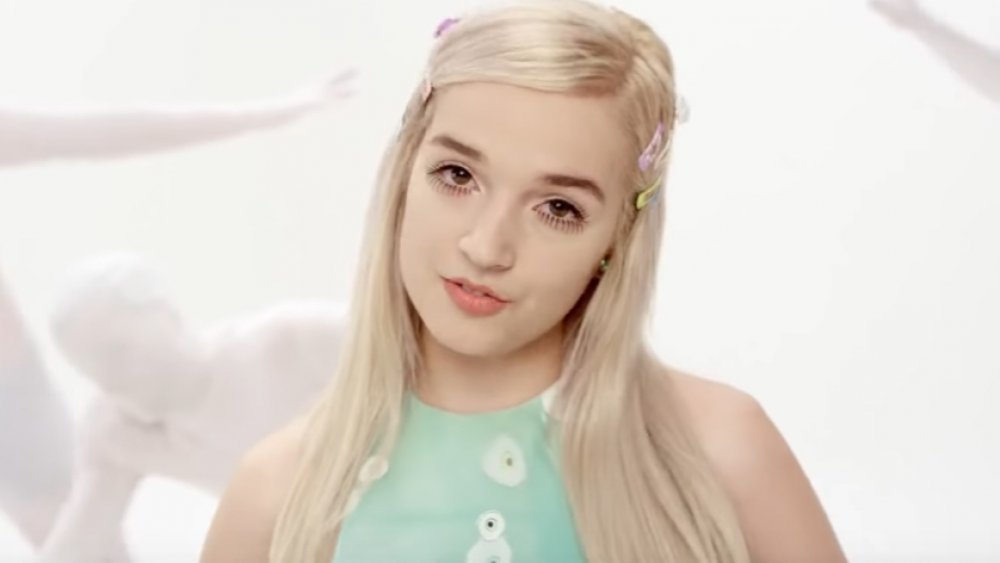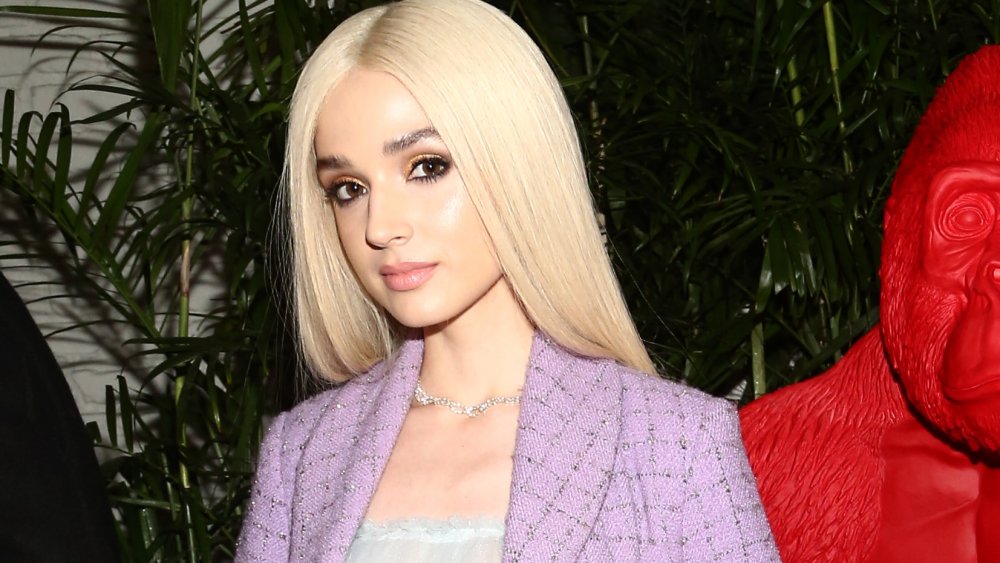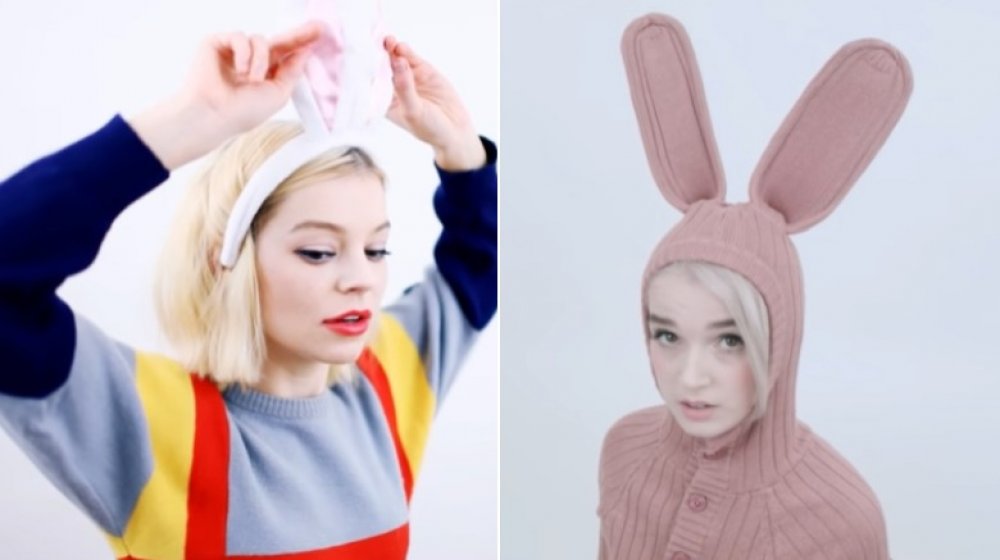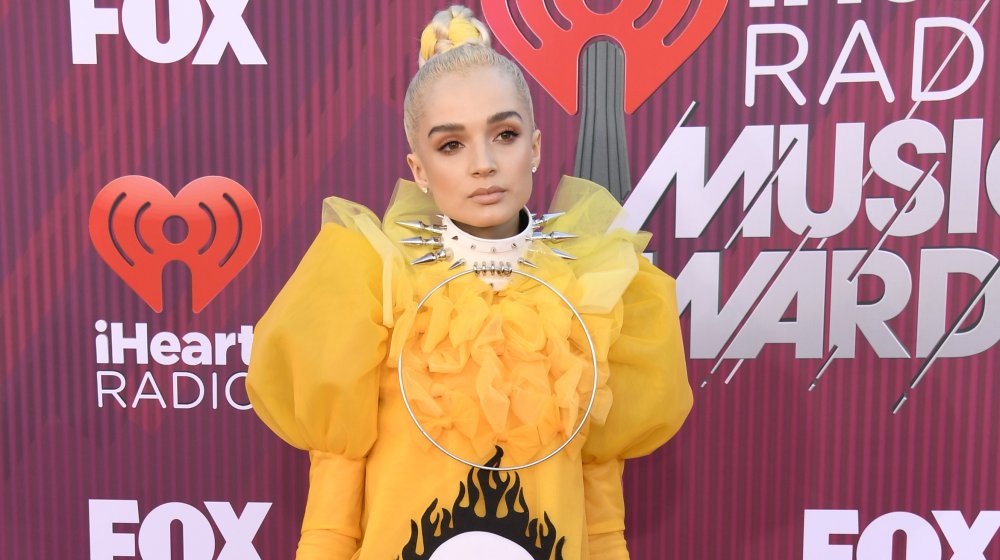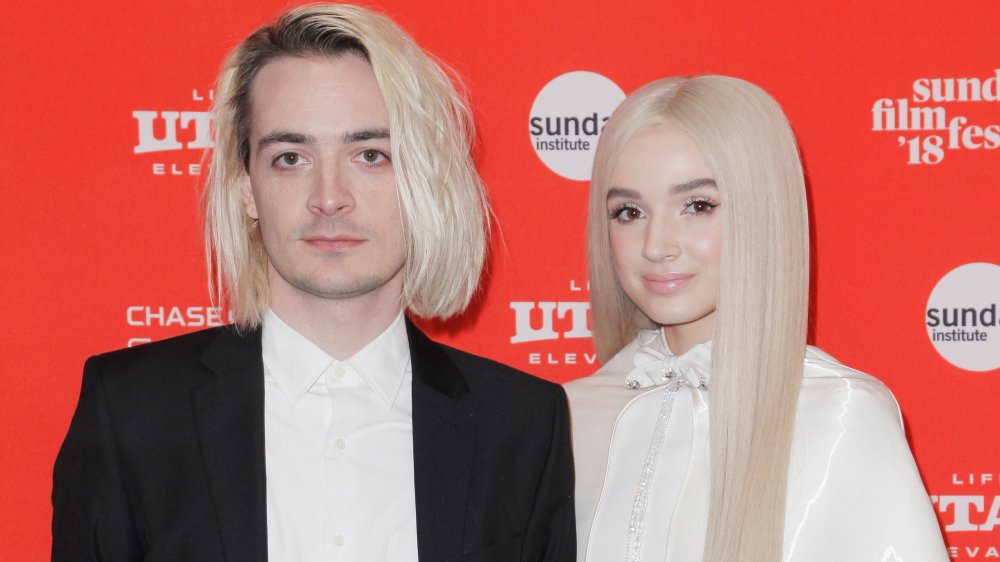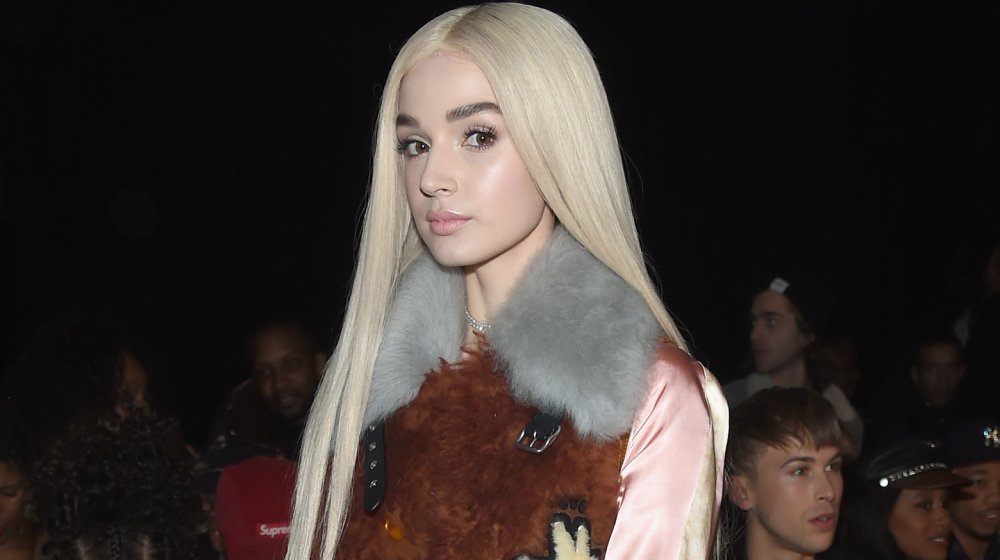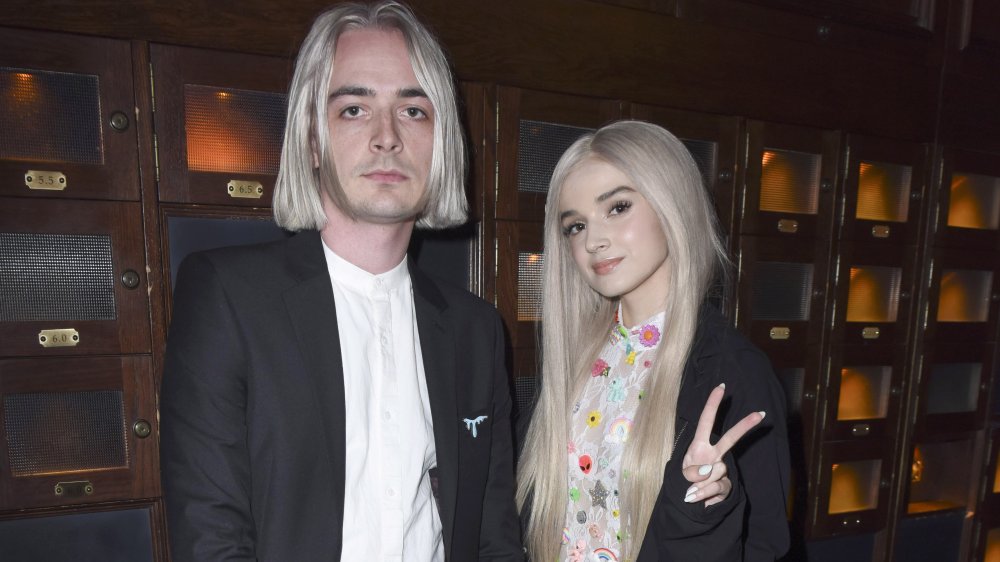The Tragic, Real-Life Story Of Poppy
Who is Poppy? It seems like no one has the same answer. The Guardian hailed the singer as a "disturbing internet meme" vying to become a "pop sensation." NPR labeled her "part bubblegum pop star, part performance artist" and possibly "part robot." New York magazine claimed she might just be the modern Andy Warhol, but still wondered, "Is she a robot, a troll, a high-concept art project, a postmodern cultural critique, a cult leader, a clever satirist? Do I get the joke? Is there a joke?"
Only one thing is clear: the YouTuber-turned-singer makes a sport out of mystery and reinvention, whether she's hiding her YouTube subscriber count (despite racking up nearly half a billion views), co-opting just enough "satanic and Illuminati symbolism" to launch a thousand internet conspiracy theories, or starting her own (now-defunct) religion.
Just as fans think they've nailed down exactly who Poppy is, she becomes something else entirely. This time around, after cutting ties with long-term creative partner Titanic Sinclair and releasing her third studio album, I Disagree — a shocking, metal-soaked full-length that somehow pays homage to both the Beach Boys and Marilyn Manson — that something might just be human. This is the tragic story of the real-life woman behind the YouTube persona, who's just starting to take off her platinum wig.
Does Poppy even exist outside of the internet?
According to New York magazine, "Poppy prefers that you not imagine her as a person who existed before her digital public life," which started in 2014 when the very first Poppy-branded video hit YouTube. After all, Poppy's close friend — a vaguely depressed basil plant — probably won't be the one uttering her darkest secrets. But hiding an entire past life from the internet is a Herculean task. Her team went through extraordinary lengths trying to erase all evidence of the star's life outside of the singer-slash-possible android, but in recent years, she's started to lift the veil.
A quick Google search reveals that the star's actual name is Moriah Pereira, and — shocker — she's no android. Before Pereira became Poppy, she was a brunette who launched her career by doing YouTube covers of popular songs like leagues of other YouTubers before her. In a 2019 NME profile, the star publicly broke her character for the very first time and admitted that she was raised in Nashville, which she describes as having a "small town feeling," and spent a lot of time alone in her bedroom before moving to Los Angeles to pursue her career. Today, she owns a Sphynx cat named Pi to keep her company (at least when he's not being the "demon man of [her] home").
Poppy was bullied in public school
Poppy's childhood wasn't all that different from her character, who's known for sitting alone in a stark white room musing about the internet. In her 2019 NME profile, the singer admitted that she "would intentionally isolate [herself] from a lot of things" when she was younger. This included public school, where she was bullied for "being skinny and quiet."
"I didn't have a positive experience [at public school]," she told NME. "I barely said any words, so that kind of opened me up, in a way, to be the target of everyone's teasing." Poppy ultimately withdrew from public school and enrolled in home school, but she wasn't taught by her parents in any sort of social environment. The singer primarily studied alone in her bedroom using the internet to help her learn everything she needed to know. "The internet was my teacher," Poppy explained in the one single statement that sums up her entire career trajectory. In case you had any doubts about the artist's true genius, she also finished her studies early.
Her dreams of becoming a Rockette never came true
Poppy's 2020 album, I Disagree, managed to garner a glowing review from The Needle Drop, which is arguably one of the highest-crowning achievements possible for a serious musician bred from internet memes and conspiracy theories. Nonetheless, Poppy's childhood dream wasn't to become a singer, a YouTuber, or a Hollywood celebrity. She wanted to dance.
According to YouTube channel Before They Were Famous, the singer practiced dance for 11 years before she ever started working on her voice. Her father was reportedly a drummer who toured with the Rockettes and Cindi Lauper, and Poppy dreamed of becoming a dancer in the famed troupe. Similarly, Lauper was also an inspiration for the future star, at least when it came to style. Her adoration for the "Girls Just Want to Have Fun" singer allegedly led her to convincing her sisters to bleach her hair when she was just six years old.
Now, Poppy never exactly realized her childhood dream, but you could say she did one better. There aren't too many Rockettes gracing magazine covers or making some serious YouTube bank, and she's allegedly worth between $1 million and $5 million. According to Business Insider, Rockettes make less than $40,000 a year.
Poppy didn't tell a soul about her first bad record deal
Poppy spent years hiding her real life from the internet, but she also hid her professional life from her real life. It's a weird dichotomy, but the girl clearly thrives on mystery. According to NME, Poppy didn't tell her family that she signed her first record deal with a major label. In fact, she moved to Los Angeles without telling a soul after inking a contract under the name ThatPoppy. This is some real Hannah Montana stuff. "I kept everyone in the dark because I didn't want anyone to get in the way," she told NME.
Strangely enough, it wasn't the record deal that changed Poppy's life. Rather, she succeeded in spite of it, not because of it. "I went through the circus at that label, the changing of the representatives or whatever, and I was coming to find out I was actually just in a really bad deal," she explained. Poppy ended up meeting her longtime collaborator, Titanic Sinclair (real name Corey Mixter), through a mutual friend not long after her move, and the pair began making YouTube videos together against the wishes of her label: "They were like, 'Hey, we don't think we should make these videos. Why are you making these videos?' I was like, 'Why are you working at a record label?!'"
She wasn't happy on Diplo's label, either
Over the years, Poppy did struggle to find the right label. In her interview with NME, she claimed that labels and other collaborators generally acted like Titanic Sinclair was the person in charge even though they were true collaborators and she was responsible for a great deal of their vision. "Not to go into gendering it and having it be about being male or female," she said, "but typically in a [business situation] like that [people] would look at Titanic for the ideas and the commands." (Alexa, play "The Man" by Taylor Swift.)
It wasn't just Poppy's first record deal that went sour. The star told the media outlet that her second deal — which Billboard reveals was with Diplo's Mad Decent Records — wasn't that great either. "It wasn't really a functioning label, which I can say now," she said to NME. "It was more of a tax write-off. There wasn't a lot of consistency going on there."
Since then, the artist has inked a deal with Sumerian Records, which is best known for housing hard rock, metal, and screamo artists like Asking Alexandria, Circa Survive, and Black Veil Brides.
Is Poppy a Poppy-cat?
In 2018, the world of Poppy was shattered when Titanic Sinclair was sued by his former girlfriend and collaborator, Mars Argo. According to The Verge, the lawsuit claimed that Argo (real name Brittany Sheets) suffered "severe emotional and psychological abuse and manipulation" at the hands of Sinclair and that the producer-director created Poppy as a "Mars Argo knockoff." Argo also sued for copyright infringement, according to TMZ.
So, was Poppy a Poppy-cat? According to Wired, Argo dated Sinclair between 2008 and 2014, the same year they released "Delete Your Facebook," which was shot on a stark white background and has the same sort of deadpan dialogue as Poppy's most famous works (see: Poppy's 2017 video that shares the same title). Later in 2014, Poppy released her first video, which was also shot in front of a stark white background. Hm.
The similarities between the pair are astounding, though it's impossible to tell who actually owns the intellectual property if Sinclair was truly Argo's collaborator. Wired reports that Poppy began wearing her brunette hair in a platinum bob — Argo's signature hairstyle — when she started working with the director. According to Billboard, both women posed "in bathtubs," "with blood dripping from their mouths," with bags of chips, and while wearing bunny ears. The Daily Mail reports that Poppy even allegedly wore a leopard print jacket belonging to Argo. Per NME, both Poppy and Sinclair have denied Argo's claims.
Poppy is a survivor
It didn't take very long for the YouTuber to fire back against Mars Argo's lawsuit, but Poppy's response forced her to metaphorically take off the platinum wig and shatter her robot-like public persona. In a series of now-deleted tweets (captured by Billboard), Poppy claimed that Argo was trying to gain publicity with her lawsuit, despite the fact that the latter scrubbed most of her work from the internet (barring whichever videos were re-uploaded by fans). Poppy also revealed that she had her own history as a survivor of domestic abuse and claimed Argo was deliberately collaborating with her abuser.
"[Argo] is well aware of the anguish I went through," Poppy tweeted (via Billboard). "In an attempt to manipulate me psychologically, Ms. Sheets is now collaborating and maintaining an ongoing relationship with the exact man who took advantage of me when I was young and vulnerable, while at the same time naming me in a lawsuit with allegations of domestic abuse."
According to Pop Crave, Poppy also tweeted out scans of the domestic violence restraining orders that she filed against Argo's alleged collaborator, Joshua Michael Moran, years before Argo filed her lawsuit in 2018.
Her lawsuit was settled with no major resolution
Mars Argo's lawsuit launched a million conspiracy theories in the YouTuber realm about Poppy and her origins. According to The Daily Dot, some fans believed the pair were connected because of something as minute as the length of a video: one of Sinclair's reported friends uploaded a disturbing Mars Argo video called "Everybody Wants It All" that was 3:36 minutes long; Poppy reportedly used the numbers 3:36 in multiple videos and recorded an unreleased song called "Guns & Gold," which repeatedly features the lyric "everybody wants it all." Argo's similarly-named video does, in fact, feature a gun. Was it a reference? It all seems like some real Illuminati stuff, but the truth is, we'll probably never know the actual answer.
According to NME, Poppy and Sinclair settled their lawsuit without divulging many details. No parties "acknowledged liability of wrongdoing" and "no money [exchanged] hands." Instead, Poppy and Sinclair agreed to stay away from Argo, Sinclair had to destroy any "compromising photos" he had of the singer, and they collectively agreed to keep any trash talk private. As of this writing, Argo has all but disappeared. The star has only tweeted once since announcing the settlement and has steered clear of Instagram.
Poppy vs. Grimes
If there ever were two artists who seemingly floated on the same bizarre wavelength, it'd be Poppy and Grimes. The Canadian treasure, known for her experimental electronic music, met her billionaire baby daddy, Elon Musk, by making a joke about AI on Twitter. For all we know, Poppy might actually be AI (or at least a human pretending to be AI), so it's a perfect pairing that went perfectly wrong.
In an NME interview, Poppy revealed that they collaborated on two songs. One of these was "Play Destroy," which was released in 2018 on Poppy's second album, Am I a Girl?. Shortly after the release, Poppy squashed the good vibes by telling Billboard (via NME) that Grimes was, essentially, a bully. She claimed she was "bullied into submission" by the Canadian songstress and her "team of self-proclaimed feminists," who pushed back the song's release for months. "I got to watch her bully songwriters into signing NDA[s] and not taking credit for songs that they were a part of," Poppy alleged. "She doesn't practice what she preaches."
According to NME, Grimes fired back, accusing Poppy of leaking the song, dragging her "into a disgusting situation," and "punishing [her] for not wanting to be part of it." This was likely a reference to the Mars Argo lawsuit, which was hitting headlines around the same time. The second collaborative track never saw the light of day, though fans suspect it might have been Grimes' song "We Appreciate Power."
Poppy used her music to cope with anger
Poppy completely reinvented herself on her third album, 2020's I Disagree, which is highly influenced by metal music — just look at the black metal-style makeup she wears on the cover. The artist has drawn comparisons to a range of popular metal acts, including Grammy-winning Iowa rockers Slipknot and Japanese kawaii outfit Babymetal. As it turns out, this version of Poppy might actually be more in line with the star's actual feelings and tastes.
The YouTuber certainly had a lot to be angry about over the previous few years: the bad record deals, the Mars Argo lawsuit, the dissolution of her partnership with Titanic Sinclair (more on that below). In an interview with NME, she revealed that she used her music to cope with these feelings. "I try to channel all of my anger steam into my art and maintain some form of composure, even when I feel I want to end everything," Poppy said, later clarifying that by "end everything" she meant the entire world. That might sound dark, but Poppy clearly has a flair for drama. The star also admitted that the more aggressive sound also came about because she was listening to a lot of heavy metal while driving to the studio for her previous output. It ain't always that deep.
Does this YouTuber actually hate the internet?
For someone who may or may not be a robot and clearly owes the entirety of her career to the internet, Poppy sure seems to hate technology. In an interview with NME, the star revealed that she doesn't trust tech like the Google Home, which she once tried to smash in a video after it fed her incorrect information about herself. She also claimed that "social media is ruining everything," despite the fact that her career has only just begun to exist outside of it. This isn't really a new idea, considering she tried to mind-control fans into deleting their Facebook accounts years ago (or at least it felt eerily similar to mind control). Could it be that Poppy, a product of the internet, has always hated the internet?
In truth, the woman behind the YouTube persona believes that the modern, social media-driven internet is "bad," and she's waiting on it to level out into something neutral. Until then, she's considering ditching her tech and getting a carrier pigeon. "I'm trying to move backwards. I'm trying to get rid of my technology. In turn it's going to make it harder to get a hold of me — and my friends mad at me — but it's OK," Poppy told NME, breaking character once again.
New Poppy has a career that exists offline and actual friends that don't come in terra cotta pots. Who would've thought?
Poppy broke free
Weeks before I Disagree's 2020 release, Poppy shocked the masses by announcing that she had cut ties with her former creative partner, Titanic Sinclair. In a Facebook post, the star made disturbing allegations about the director-producer and expressed remorse for defending a person she initially believed was "misunderstood."
"I was never 'an accomplice' to this person's past actions like some believe," Poppy wrote, directly referencing Mars Argo's lawsuit. "I was a person who suffered similar wrong doings as one of his former partners brought to light. This person glamorizes suicide and has used it many times in the past to manipulate me." Poppy then went on to reveal that her last straw was when Sinclair allegedly messaged fans before trying to hang himself with an item that belonged to her: "These are tactics that he used for years. This person lives an illusion that he is a gift to this Earth. He weaved himself into a storyline, wanting the public to believe he was a puppeteer, which is so far from the truth."
Poppy also claimed that she felt "trapped in a mess that [she] needed to dig [her] way out of," and that Sinclair was allegedly using her former friends "as his next experiment" — which seems a whole lot like Argo's allegations. As of this writing, Sinclair has not publicly spoken out, but he's removed almost all traces of Poppy from his Instagram account.


